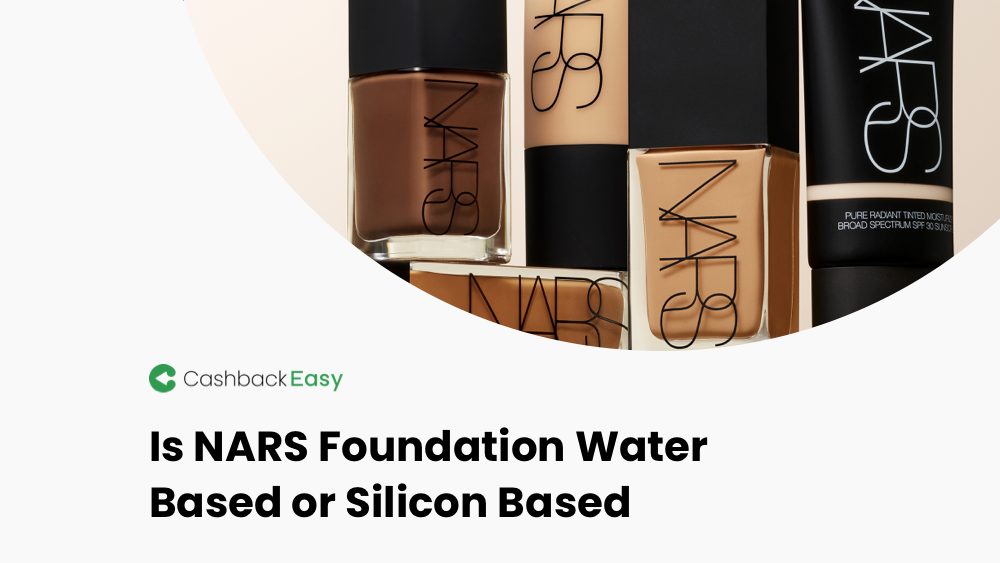Table of Content
- Is NARS light reflecting foundation water based
- Is NARS natural radiant foundation water based
- Is NARS soft matte foundation water based
- Is NARS sheer glow foundation water based
- Is NARS foundation non comedogenic
- Does NARS foundation have spf
- Does NARS foundation oxidize
NARS, a renowned cosmetics brand, has captivated the beauty world with its extensive range of products, including foundations, concealers, and lipsticks that have become favorites among makeup enthusiasts. Among these, foundations hold a special place as the cornerstone of any makeup routine. They form the base upon which the entire look is built, making direct contact with our skin and determining the overall finish. With this in mind, we’ll delve into the world of NARS foundations, exploring their ingredients to uncover their unique characteristics and functions, addressing commonly asked questions, and empowering you to make an informed choice that perfectly suits your skin.
To determine whether a NARS foundation is water-based or silicone-based, it’s crucial to grasp the distinction between these two categories. Foundations generally fall into three groups: water-based, oil-based, and silicone-based.
Water-Based Foundations:
Water-based foundations, with water as their primary ingredient, are oil-free. Their lightweight and blendable texture allows for effortless application without compromising pore breathability or adding unnecessary weight to the skin. This makes them an ideal choice for individuals with sensitive or acne-prone skin, as they minimize the risk of clogging pores and exacerbating breakouts.
Silicone-Based Foundations:
Silicone-based foundations, characterized by the presence of silicone derivatives often ending in “cone” or “siloxane,” offer substantial coverage and a more substantial makeup finish. However, their heavier texture can lead to pore congestion and breakouts for those with acne-prone skin. Therefore, proper skincare is essential when using silicone-based foundations to prevent potential damage.
Oil-Based Foundations:
Oil-based foundations, enriched with oils and emollients, create a hydrating and nourishing environment for the skin, providing excellent moisture levels. While beneficial for dry skin types seeking a dewy finish, they may not be suitable for oily or acne-prone skin due to the increased risk of clogging pores and triggering breakouts.
Next, by examining the ingredient lists of NARS foundations, we can determine whether they fall into the water-based, silicone-based, or oil-based categories.

Is NARS light reflecting foundation water based
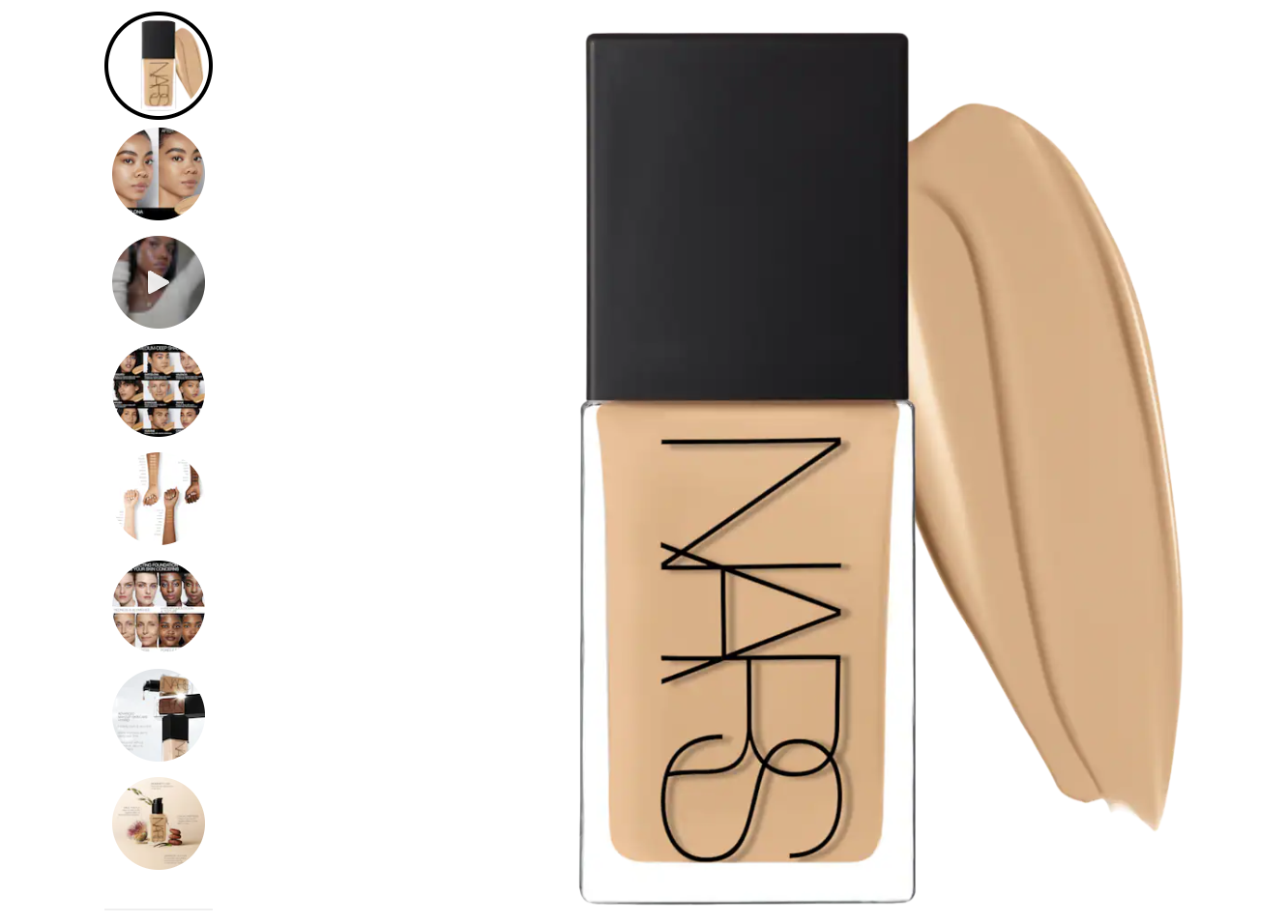
image from sephora.com
NARS light reflecting foundation ingredients
Water/Aqua/Eau, C9-12 Alkane, Butylene Glycol, Undecane, Tridecane, Isodecyl Neopentanoate, Hydrogenated Polyisobutene, Polyglyceryl-6 Polyricinoleate, Polyglyceryl-2 Diisostearate, Disteardimonium Hectorite, Diisostearyl Malate, Glycerin, Synthetic Wax, Sodium Chloride, Ophiopogon Japonicus Root Extract, Ascophyllum Nodosum Extract, Theobroma Cacao (Cocoa) Seed Extract, Curcuma Longa (Turmeric) Root Extract, Silybum Marianum Fruit Extract, Aluminum Hydroxide, Magnesium Chloride, Sodium Dilauramidoglutamide Lysine, Tocopherol, Coco-Caprylate/Caprate, Ethylhexylglycerin, Pentylene Glycol, Hydroxyphenyl Propamidobenzoic Acid, Ascorbyl Palmitate, Citric Acid, Sea Water/Maris Aqua/Eau De Mer, Trisodium EDTA, Barium Sulfate, Alumina, Chlorphenesin, Phenoxyethanol, Potassium Sorbate
May Contain: Mica, Titanium Dioxide (Ci 77891), Iron Oxides (Ci 77491)•Iron Oxides (Ci 77492)•Iron Oxides (Ci 77499)
By scrutinizing the ingredient list of this foundation, we can determine its true identity. The top three ingredients are Water/Aqua/Eau, C9-12 Alkane, and Butylene Glycol. Notably, there are no ingredients ending in “-cone” or “-siloxane,” which are characteristic of silicone-based components. This absence confirms that NARS light reflecting foundation belongs to the water-based category.
Is NARS natural radiant foundation water based
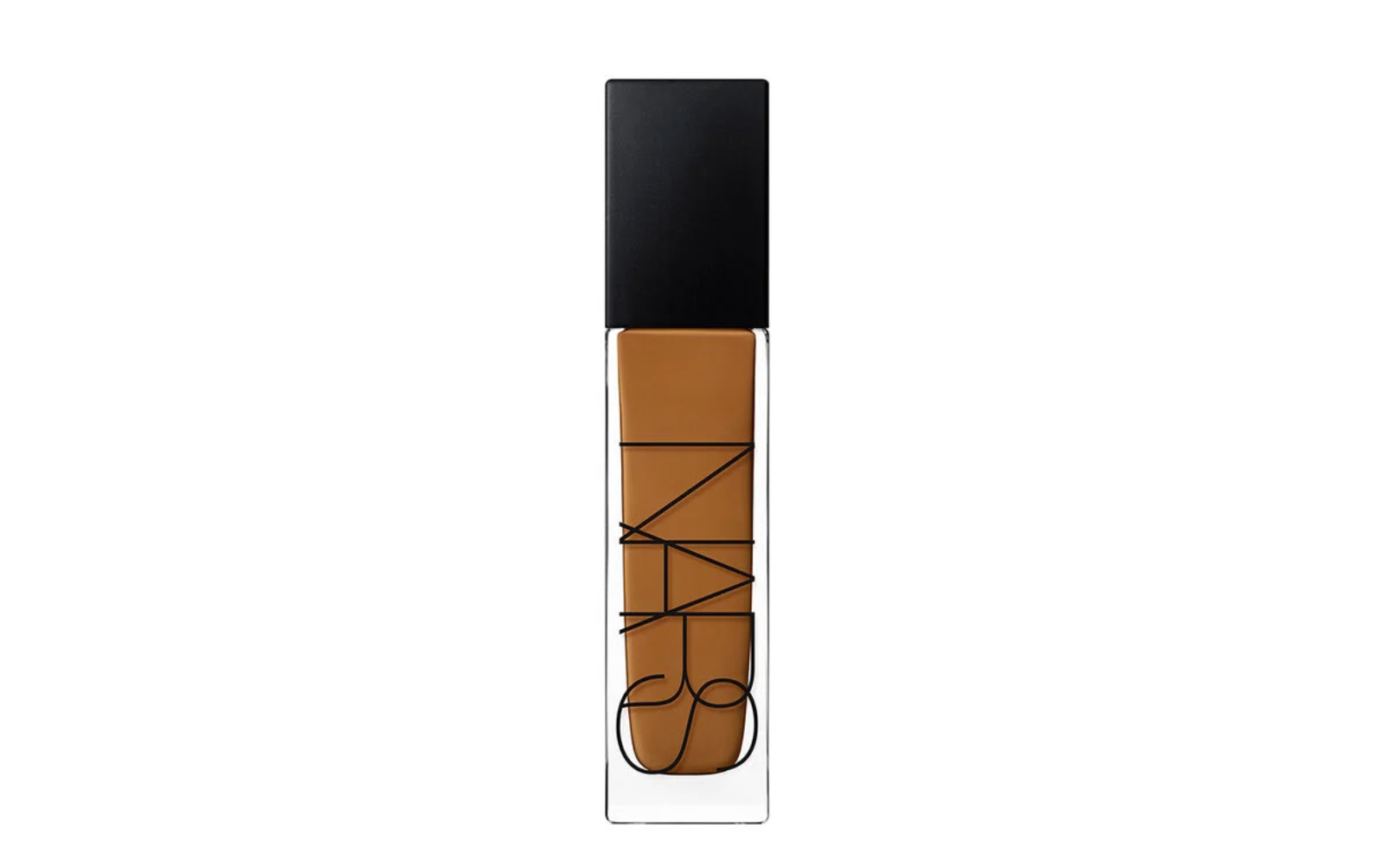
NARS natural radiant foundation ingredients
Dimethicone, Water/Aqua/Eau, Phenyl Trimethicone, Glycerin, Polymethylsilsesquioxane, PEG-10 Dimethicone, Dimethicone Crosspolymer, Cyclopentasiloxane, Trimethylsiloxysilicate, PPG-3 Benzyl Ether Myristate, Boron Nitride, Bis-Butyldimethicone Polyglyceryl-3, Butylene Glycol, Sorbitan Sesquiisostearate, Rubus Idaeus (Raspberry) Fruit Extract, Citrullus Lanatus (Watermelon) Fruit Extract, Pyrus Malus (Apple) Fruit Extract, Lens Esculenta (Lentil) Fruit Extract, Tocopherol, Sodium PCA, Sodium Lactate, Disodium Stearoyl Glutamate, Hydrogenated Polydecene, Pentaerythrityl Tetraethylhexanoate, PEG/PPG-14/7 Dimethyl Ether, Pentaerythrityl Tetra-Di-T-Butyl Hydroxyhydrocinnamate, Sodium Stearoyl Glutamate, Behenic Acid, Stearic Acid, Stearyl Alcohol, Behenyl Alcohol, Disteardimonium Hectorite, Triethoxycaprylylsilane, Barium Sulfate, Aluminum Dimyristate, Alumina, Tin Oxide, Polysilicone-2, Potassium Hydroxide, Phenoxyethanol, Sodium Benzoate, Potassium Sorbate
May Contain: Mica, Titanium Dioxide (Ci 77891), Iron Oxides (Ci 77491)•Iron Oxides (Ci 77492)•Iron Oxides (Ci 77499)
A closer look at the ingredient list of this foundation reveals that the top three ingredients are Dimethicone, Water/Aqua/Eau, and Phenyl Trimethicone. Notably, two of these ingredients, Dimethicone and Phenyl Trimethicone, end with the suffix “-cone,” a hallmark of silicone-based ingredients. This classification confirms that NARS natural radiant foundation falls into the silicone-based category.
Is NARS soft matte foundation water based
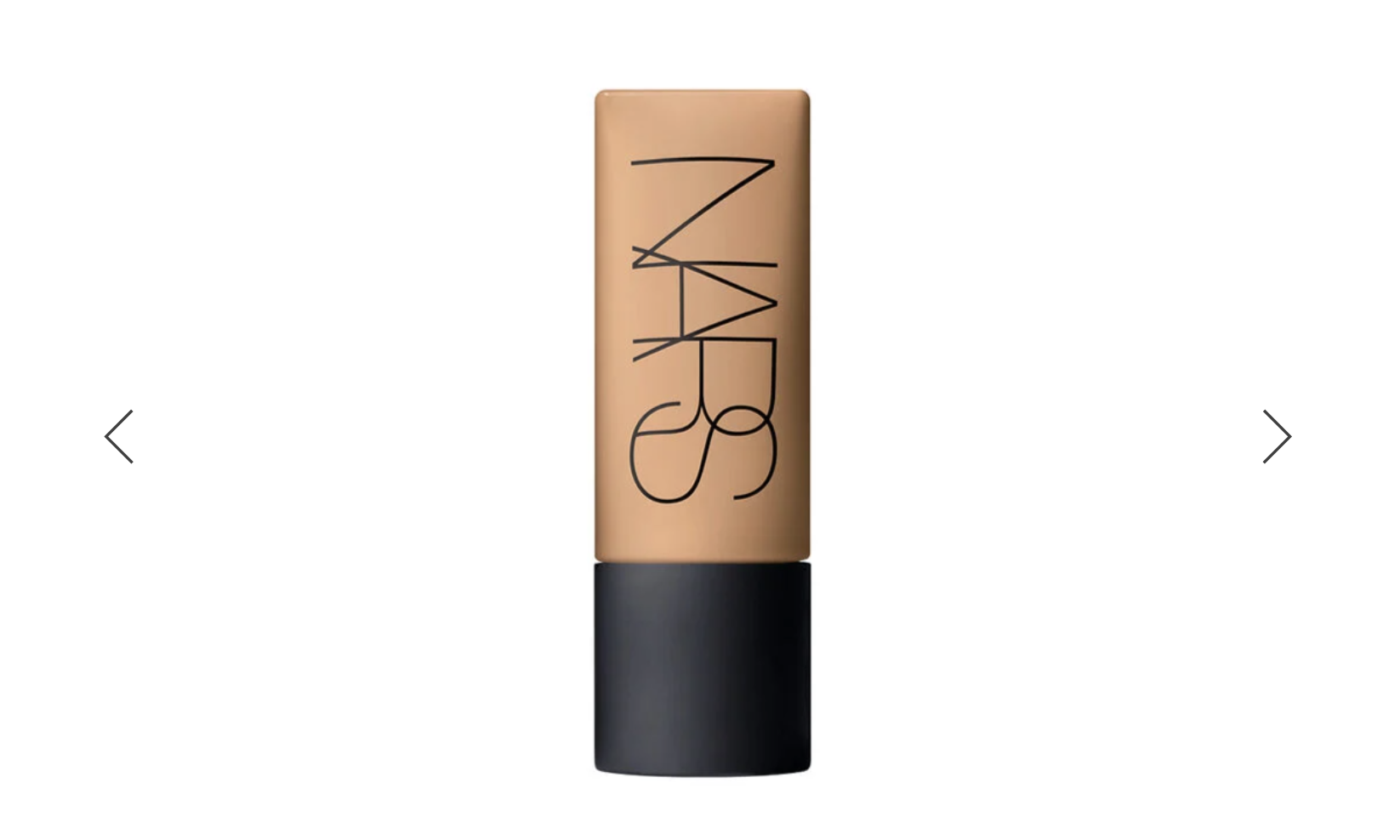
NARS soft matte foundation ingredients
Water/Aqua/Eau, Dimethicone, Methyl Methacrylate Crosspolymer, Trimethylsiloxysilicate, Glycerin, Lauryl PEG-9 Polydimethylsiloxyethyl Dimethicone, Sodium Chloride, Bis-Butyldimethicone Polyglyceryl-3, Oryza Sativa (Rice) Bran Extract, Helianthus Annuus (Sunflower) Extract, Rosmarinus Officinalis (Rosemary) Leaf Extract, Plankton Extract, Alteromonas Ferment Extract, PEG-12 Dimethicone, PEG-10 Dimethicone, Butylene Glycol, Aluminum Hydroxide, Polysilicone-2, Disteardimonium Hectorite, Barium Sulfate, Tocopherol, Hydrogen Dimethicone, Sodium Acetylated Hyaluronate, Alumina, Glucose, Hydrolyzed Pea Protein, Sodium Succinate, Phenoxyethanol
May Contain: Iron Oxides (Ci 77491),Iron Oxides (Ci 77492),Iron Oxides (Ci 77499), Mica, Titanium Dioxide (Ci 77891)
By examining the ingredient list of this foundation, we can uncover its true identity. The top three ingredients are Water/Aqua/Eau, Dimethicone, and Methyl Methacrylate Crosspolymer. Interestingly, Dimethicone holds the second position, indicating its significant presence in the formula. This revelation confirms that NARS soft matte foundation belongs to the silicone-based category.
Is NARS sheer glow foundation water based
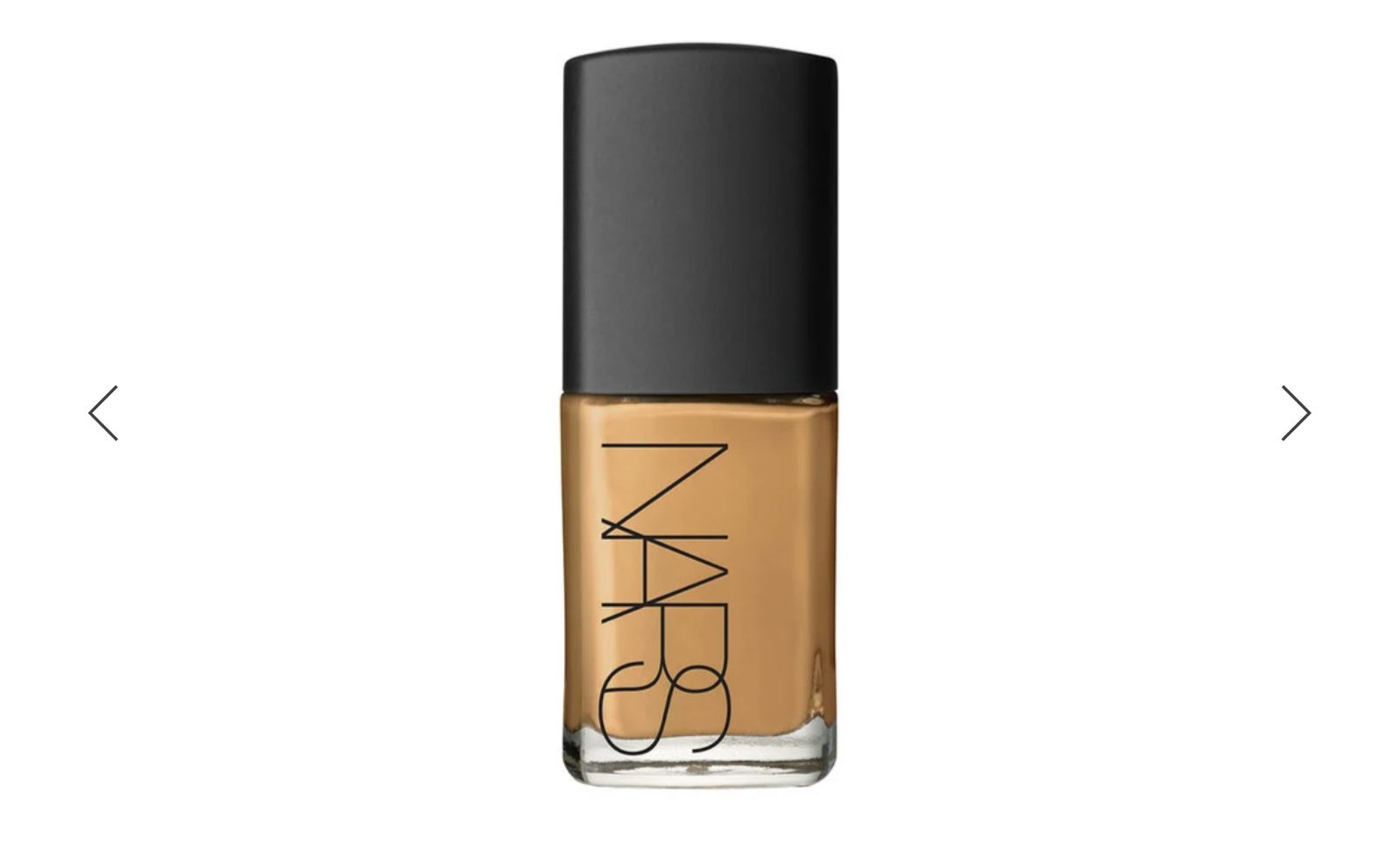
NARS sheer glow foundation ingredients
Water, Cyclopentasiloxane, Butylene Glycol, Glycerine, Polymethylsilsesquioxane, Dimethicone, Dimethicone/Vinyl Dimethicone Crosspolymer, Triethylhexanoin, Peg-10 Dimethicone, Bis-Butyldimethicone Polyglyceryl-3, Disteardimonium Hectorite, Sodium Glutamate, Sorbitan Sesquiisostearate, 1-Methylhydantoin-2-Imide, Phenoxyethanol, Sodium Dehydroacetate, Triethoxycaprylylsilane, Polysilicone-2, Serralysin, Curcuma Longa, Glucosyl Hesperidin, Ascorbyl Glucoside, Tocopherol, Ci 77891 (Titanium Dioxide), Ci 77492 (Iron Oxides), Ci 77491 (Iron Oxides), Ci 77499 (Iron Oxides)
By examining the ingredient list of this foundation, we can uncover its true identity. The top three ingredients are Water, Cyclopentasiloxane, and Butylene Glycol. Interestingly, Cyclopentasiloxane holds the second position, indicating its significant presence in the formula. This revelation confirms that NARS sheer glow foundation belongs to the silicone-based category.
Is NARS foundation non comedogenic
Comedones, commonly known as blackheads and whiteheads, are a type of acne that forms when dead skin cells and sebum (oil) clog your pores. Except for excessive sebum production, hormonal changes and genetics, Some cosmetic ingredients, like certain oils, waxes, and comedogenic silicones (ending in “-cone” or “-siloxane”), have been shown to clog pores and contribute to comedones. A 2002 study in IJCS evaluated the comedogenic potential of various cosmetic ingredients. The study found that some ingredients, particularly certain oils and silicones, were more likely to clog pores. (https://www.ncbi.nlm.nih.gov/pmc/articles/PMC8387765/)
Here are some other ingredients that may cause comedones
Coconut Oil: While touted for its various benefits, coconut oil is a known comedogenic ingredient for some people due to its high lauric acid content. (https://www.paulaschoice.com/ingredient-dictionary/ingredient-shea-butter.html)
| Type of Coconut Oil | Processing | Refining | Color | Odor | Application | Features |
| Virgin Coconut Oil | Mechanical (e.g., cold-pressing) | Unrefined | Clear or slightly hazy white | Mild coconut | Moisturizers and Lotions, Hair Care Products | Moisturizing: Virgin coconut oil is a natural emollient that can help hydrate and soften the skin. Antimicrobial Properties: Lauric acid, a major component of virgin coconut oil, has some antimicrobial properties that might be beneficial in certain skincare products. Comedogenic: Virgin coconut oil can be comedogenic for some people, meaning it can clog pores and contribute to breakouts. This is especially true for those with acne-prone skin. |
| Refined Coconut Oil | Copra or Virgin Coconut Oil | Refined | White | Odorless | Moisturizers and Lotions, Hair Care Products, Makeup Products | Lighter and Less Greasy: Refined coconut oil has a lighter texture than virgin coconut oil, making it a better option for formulations that need to be less greasy or heavy on the skin. Longer Shelf Life: Since it’s been refined, it has a longer shelf life compared to virgin coconut oil. Less Comedogenic: Refined coconut oil is generally considered less comedogenic than virgin coconut oil, making it a more suitable choice for people with acne-prone skin. However, some individuals may still experience comedones from refined coconut oil. |
| Fully Refined Coconut Oil (a type of Refined Coconut Oil) | Refined Coconut Oil | Fully Refined | White | Odorless | ||
| Fractionated Coconut Oil (MCT Oil) (a type of Refined Coconut Oil) | Refined Coconut Oil | Highly Refined | Clear | Odorless |
Mineral Oil: Mineral oil is a petroleum-based ingredient found in some cosmetics. While it doesn’t irritate the skin, it can clog pores for some individuals. (https://www.paulaschoice.com/ingredient-dictionary/ingredient-mineral-oil.html)
Isopropyl Myristate: This fatty alcohol is a common ingredient in cosmetics and can be comedogenic for some people. (https://www.paulaschoice.com/expert-advice/skincare-advice/acne-and-breakouts/will-it-make-me-break-out.html)
Compared to water-based foundations, silicone-based foundations may be more likely to cause breakouts. NARS’ silicone-based foundations do not contain other ingredients that are commonly known to cause breakouts, such as Coconut Oil and Isopropyl Myristate. However, this does not mean that these silicone-based foundations are completely non-comedogenic.
Does NARS foundation have spf
Common sunscreen ingredients used in cosmetic foundations include:
Mineral sunscreens: Zinc Oxide and Titanium Dioxide
Chemical sunscreens: Oxybenzone, Octinoxate, Avobenzone (see previous information for details on these)
Based on their ingredients, all of these foundations contain Titanium Dioxide, but the content is relatively high. Therefore, NARS foundations do offer some sun protection, but the level of protection is not strong.
Does NARS foundation oxidize
Foundation and cushion products are typically emulsifier-based. They use water, oil, and powder combined with emulsifiers to blend otherwise immiscible substances into a uniform system. To ensure that products apply quickly and feel lightweight, many volatile types of oils are included in cosmetics. When we apply these products, these oils quickly evaporate, subtly affecting the product’s color and potentially causing the foundation to appear dull. Therefore, the rate of oxidation partly depends on the oil content in the foundation. Generally, the more moisturizing a product is, the more prone it is to oxidation due to its higher oil content.
It’s important to note that all foundations oxidize, and NARS is no exception. The difference lies in how quickly they oxidize.

